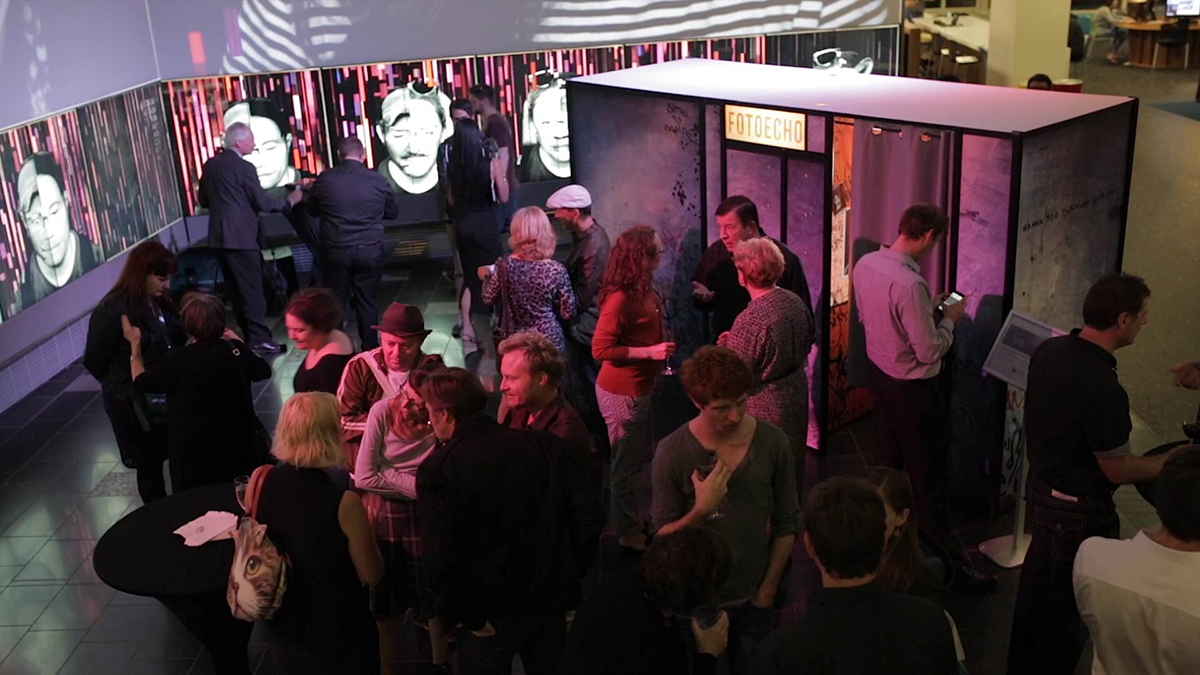
Echo — sounding for empathy
Early this year, artist Georgie Pinn was awarded a three-month residency at The Cube, in Queensland University of Technology’s Science and Engineering Centre, to develop and exhibit her interactive artwork Echo, which was shown in QUT’s Robotronica. The Cube brings together researchers from the STEM disciplines and the Creative Industries.
Echo is a singular experience of interpersonal portraiture and narrative that attempts to engender responses of empathy and identification. In a media culture dominated by sound bites, tweets, Instas and Snapchats, Echo swims against the tide, revealing deeper potentials for human and transhuman interaction.
Taking a form similar to the photo-booth, the work links back to older technologies — to an era of pre-digital images where photos were arguably more intimate, precious and less disposable. Photo-booths were designed for taking official headshots for passports or other identification documents, but were popularly used for taking photos of friends and couples play-acting and pranking. This booth calls herself Echo and offers to “help you connect.”
Leaping from the daggy analogue past to an AI future, you sit down and touch the screen as instructed. Echo takes your photograph, placing it centre screen, and brings up a side menu of other people’s faces. When selected, each still portrait then plays as a short film, telling a highly personal story of an important life experience. The booth is now a confessional, linking back to even older technologies and social relations. The interface’s aesthetic mix of popular entertainment, official surveillance, retro and sci-fi is tightly controlled, seamless and original.
While a film plays, Echo gradually maps your face onto the narrator’s, so that by the time the story is finished it is still your own face, but slightly distorted by the speaker seen behind. You select other characters, all quite different in age, race, gender and appearance with no hint of what their story might be. Each time your face meshes with theirs, as though listening were a transformative act of absorption. The stories are intimate in nature, often dealing with difficult life experiences that relate to the person’s appearance, including experiences of discrimination. These are stories that would only be told to a trusted friend, someone who would listen with sympathy and understanding. The meshed portraits are uncanny and watching yourself tell their story, wear their account, is unnerving.

Echo, Georgie Pinn, photo courtesy the artist
Echo works to suspend judgement and urge reflection, prompting thoughts such as, ‘What if this story were mine?’, ‘what if this had happened to me?’ The filmed subjects are not the characters of a game, their stories are not clues for a puzzle-solving exercise, they are not your friends or part of your social circle. Echo is a relational archive that can potentially teach the value of intimacy, the value of listening to those unlike ourselves in a way that allows us to experience that difference safely. Such acts of identification, however mediated, may expand identity formation and build tolerance. Pinn’s use of technology may potentially foster a deeper sense of inquiry into what it is to be human.
The next phase of the work is more playful. In real time, sections of your face on screen can be selected and replaced by the facial portraits in Echo’s gallery. These include more characters than the narrators, and even animals. The hybrid portraits animate in real time by mirroring your facial movements through facial tracking technology. When the portrait play is completed, there is an option to upload the portrait to Facebook. This stage of the work is perhaps not as successful as the first, but it nevertheless continues to build the interpersonal, allowing the viewer to feel the slippage between identity and appearance, raising awareness of the constructed and fluid nature of both. The mirroring and tracking technology intensifies the experience of the uncanny and turns the viewer’s gaze inwards via self-portraiture. Echo’s dynamic unpacking of self and other pivots beautifully around the stranger without and the stranger within.
Interestingly when Pinn was developing the work, she initially produced the confessional stories as fictional narratives, based on real accounts, written and acted with QUT drama students. However, this proved a degree of mediation too far. In the end she approached her friends to participate, drawing on an existing platform of rapport and trust. Echo certainly relies on the authenticity of the first-hand accounts, but it also succeeds through Pinn’s masterful editing which makes the accounts sharp, compelling and sometimes confronting. You are not being asked to bond with these individuals; their stories are for you, to bear and understand, and that emphasis offers a critical perspective on the nature of media communications. The mediascape is undoubtedly becoming more intensely personalised and predictive, as consumers are profiled and targeted ever more closely and competitively. Echo pursues an alternative line of transhuman communications, deeply invested in a feminist ethics of care. It is Pinn’s intention to keep developing Echo and build the archive of intimate confessions. Perhaps Echo might one day become a real AI, directing us to the stories that really open our eyes, saving us from narcissism’s curse.
See videos of Echo in action here and here.
Read more about Georgie Pinn and Echo.
–
QUT, Robotronica: Georgie Pinn, Echo, commissioned by The Cube; The Cube,Brisbane, 20 Aug
Beth Jackson is an independent arts writer and curator based in Brisbane. She is the owner and Director of Artfully, an arts consultancy with a focus on art for the public realm.
Top image credit: Echo, Georgie Pinn, photo courtesy the artist






